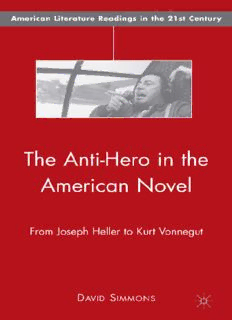
The Anti-Hero in the American Novel: From Joseph Heller to Kurt Vonnegut (American Literature Readings in the Twenty-First Century) PDF
Preview The Anti-Hero in the American Novel: From Joseph Heller to Kurt Vonnegut (American Literature Readings in the Twenty-First Century)
The Anti-Hero in the American Novel 99778800223300660033223333ttss0011..iinndddd ii 33//2244//22000088 22::3300::2233 PPMM American Literature Readings in the 21st Century Series Editor: Linda Wagner-Martin American Literature Readings in the 21st Century publishes works by contemporary critics that help shape critical opinion regarding literature of the nineteenth and twentieth century in the United States. Published by Palgrave Macmillan: Freak Shows in Modern American Imagination: Constructing the Damaged Body from Willa Cather to Truman Capote By Thomas Fahy Arab American Literary Fictions, Cultures, and Politics By Steven Salaita Women & Race in Contemporary U.S. Writing: From Faulkner to Morrison By Kelly Lynch Reames American Political Poetry in the 21st Century By Michael Dowdy Science and Technology in the Age of Hawthorne, Melville, Twain, and James: Thinking and Writing Electricity By Sam Halliday F. Scott Fitzgerald’s Racial Angles and the Business of Literary Greatness By Michael Nowlin Sex, Race, and Family in Contemporary American Short Stories By Melissa Bostrom Democracy in Contemporary U.S. Women’s Poetry By Nicky Marsh James Merrill and W.H. Auden: Homosexuality and Poetic Influence By Piotr K. Gwiazda Contemporary U.S. Latino/a Literary Criticism Edited by Lyn Di Iorio Sandín and Richard Perez The Hero in Contemporary American Fiction: The Works of Saul Bellow and Don DeLillo By Stephanie S. Halldorson Race and Identity in Hemingway’s Fiction By Amy L. Strong Edith Wharton and the Conversations of Literary Modernism By Jennifer Haytock The Anti-Hero in the American Novel: From Joseph Heller to Kurt Vonnegut By David Simmons 99778800223300660033223333ttss0011..iinndddd iiii 33//2244//22000088 22::3300::2233 PPMM The Anti-Hero in the American Novel From Joseph Heller to Kurt Vonnegut David Simmons 99778800223300660033223333ttss0011..iinndddd iiiiii 33//2244//22000088 22::3300::2233 PPMM THE ANTI-HERO IN THE AMERICAN NOVEL Copyright © David Simmons, 2008. All rights reserved. No part of this book may be used or reproduced in any manner whatsoever without written permission except in the case of brief quotations embodied in critical articles or reviews. First published in 2008 by PALGRAVE MACMILLAN™ 175 Fifth Avenue, New York, N.Y. 10010 and Houndmills, Basingstoke, Hampshire, England RG21 6XS Companies and representatives throughout the world. PALGRAVE MACMILLAN is the global academic imprint of the Palgrave Macmillan division of St. Martin’s Press, LLC and of Palgrave Macmillan Ltd. Macmillan® is a registered trademark in the United States, United Kingdom and other countries. Palgrave is a registered trademark in the European Union and other countries. ISBN-13: 978–0–230–60323–3 ISBN-10: 0–230–60323–8 Library of Congress Cataloging-in-Publication Data Simmons, David, 1979– The anti-hero in the American novel : from Joseph Heller to Kurt Vonnegut / David Simmons. p. cm.—(American literature readings in the twenty-first century) Includes bibliographical references and index. ISBN 0–230–60323–8 (alk. paper) 1. American fiction—20th century—History and criticism. 2. Antiheroes in literature. I. Title. PS374.A57S56 2008 8139.5409352—dc22 2007044445 A catalogue record for this book is available from the British Library. Design by Newgen Imaging Systems (P) Ltd., Chennai, India. First edition: June 2008 10 9 8 7 6 5 4 3 2 1 Printed in the United States of America. 99778800223300660033223333ttss0011..iinndddd iivv 33//2244//22000088 22::3300::2244 PPMM To the memory of Kenneth A. Yeoman. A Good Friend. 99778800223300660033223333ttss0011..iinndddd vv 33//2244//22000088 22::3300::2244 PPMM This page intentionally left blank Contents Preface ix Acknowledgments xiii 1 The Rebel with a Cause? The Anti-Heroic Figure in American Fiction of the 1960s 1 2 Individualism and the Anti-Capitalist, Anti-Heroic Figure in American Fiction of the 1960s 43 3 The Outlaw Returns: The Cowboy in American Fiction of the 1960s 81 4 Sinner or Saint? The Anti-Hero as Christ Figure in the American Novel of the 1960s 113 Conclusion 147 Notes 153 Bibliography 183 Index 197 99778800223300660033223333ttss0011..iinndddd vviiii 33//2244//22000088 22::3300::2244 PPMM This page intentionally left blank Preface The national tradition of the anti-hero is crucial to the American novel of the 1960s. Events such as the Vietnam War and the subse- quent peacenik movement, the civil rights crusade, the wide-scale use of hallucinogenic drugs such as LSD, and the emergence of the hip- pies all suggest that the 1960s was a highpoint for rebellion against the state. Indeed, so great was the amount of opposition to the American hegemony during the 1960s that the anti-state movement was termed the ‘counterculture’1 by Theodore Roszak, an American professor and social critic. The concept of the counterculture quickly entered the national vernacular, being written about by a range of theorists and philosophers such as Herbert Marcuse, whose work came to dominate intellectual discussion of the period. Given the tumultuous climate of the 1960s, it is perhaps not sur- prising that the novel should reflect the rebelliousness of the public. Books such as Catch-22 (1961), One Flew Over the Cuckoo’s Nest (1962), The Graduate (1963), The Man Who Fell to Earth (1963), Little Big Man (1964), Midnight Cowboy (1965), Cool Hand Luke (1966), and Slaughterhouse Five (1969) found immense popularity for their depictions of dissident, subversive individuals opposed to the ideological mores of the establishment. Such was the audience for the anti-heroic that many of these characters quickly transcended the confines of the page to become cultural icons, with novels translated into other mediums such as film and theater. The sheer breadth of rebellion that occurred during the 1960s makes it clear that it is impossible for a single work to cover every figure classifiable as anti-heroic in the fiction of the period.2 Instead, each chapter of this book analyzes a 1960s utilization of the anti- hero, and explores, with reference to specific textual examples, how writers criticize the value systems of society through the subversion of traditional heroic exemplars. In accordance with this purpose I single out three of what I consider to be the most important heroic exem- plars within American culture: the capitalist or entrepreneurial indi- vidual, the cowboy, and the Christ figure. I devote a chapter to 99778800223300660033223333ttss0011..iinndddd iixx 33//2244//22000088 22::3300::2244 PPMM
Description: